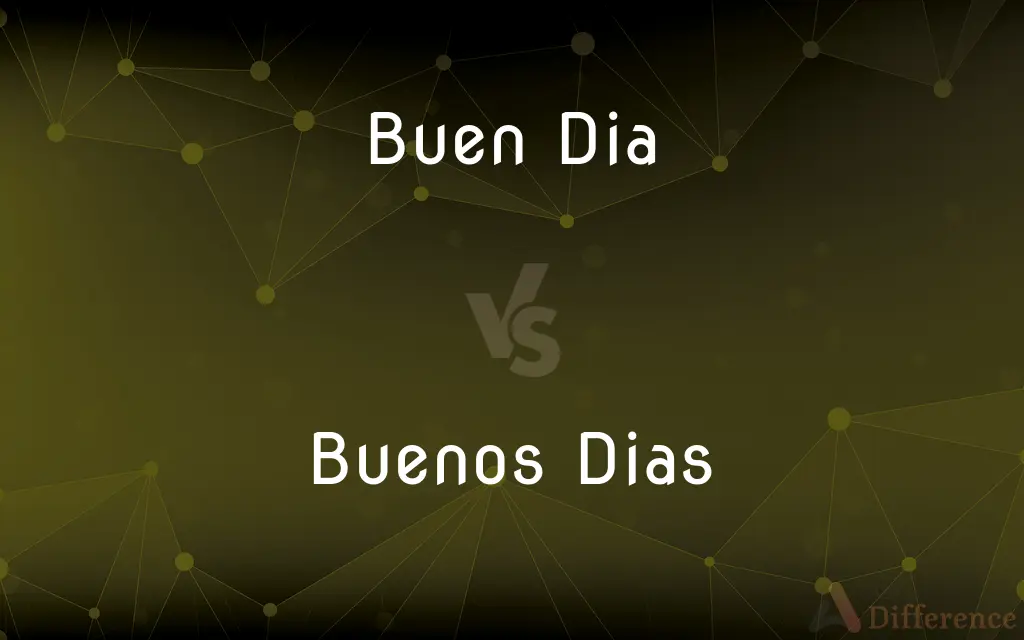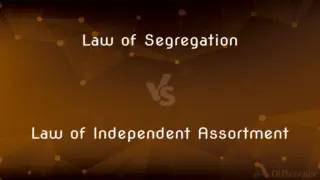Buen Dia vs. Buenos Dias — What's the Difference?
Edited by Tayyaba Rehman — By Fiza Rafique — Published on December 10, 2023
Buen Dia and Buenos Dias both mean "good day" in Spanish. "Buen Dia" is singular and can be used throughout the day. "Buenos Dias" is plural and typically used in the morning.

Difference Between Buen Dia and Buenos Dias
Table of Contents
ADVERTISEMENT
Key Differences
Buen Dia and Buenos Dias are both Spanish greetings that convey well wishes for the day. While they might seem interchangeable, they have slight distinctions in usage and nuance. Buen Dia, which directly translates to "good day," can be employed any time throughout the day. In contrast, Buenos Dias, which translates to "good mornings," is mainly used in the morning as a greeting.
Buen Dia is the singular form, signifying a single 'good day'. It's more general in nature and doesn't pinpoint a specific time of day. This greeting is versatile and might be heard in various Spanish-speaking regions at any time during daylight hours. On the other hand, Buenos Dias emphasizes the plural "mornings." This makes it more specific and, as a result, is often the first greeting exchanged upon waking up or starting one's day.
The distinction between Buen Dia and Buenos Dias can also reflect regional preferences. In some places, you might hear Buen Dia more frequently, while in others, Buenos Dias might be the standard morning greeting.
Both Buen Dia and Buenos Dias encapsulate the warmth and politeness intrinsic to the Spanish language. They're a testament to the culture's emphasis on greeting everyone in a friendly manner. Regardless of the specific phrase used, the intent is to wish someone a pleasant day.
Comparison Chart
Translation
Good day
Good mornings
ADVERTISEMENT
Grammatical Number
Singular
Plural
Time of Day
Anytime during the day
Typically morning
General/Specific Nature
More general
More specific to mornings
Usage Regions
Varies; some regions prefer it
Common in most Spanish-speaking areas
Compare with Definitions
Buen Dia
A flexible greeting that can be used throughout daylight hours.
Even at lunchtime, it's not uncommon to hear ¡Buen Dia!
Buenos Dias
A plural expression wishing someone multiple good mornings.
¡Buenos Dias! the children cheered, bright and early.
Buen Dia
A Spanish greeting used any time of the day.
I met Maria in the afternoon, and she greeted me with a cheerful ¡Buen Dia!
Buenos Dias
A greeting primarily used to kickstart one's day.
As soon as the meeting began, everyone chorused, ¡Buenos Dias!
Buen Dia
A singular phrase wishing someone a pleasant day.
¡Buen Dia! he exclaimed, despite the cloudy weather.
Buenos Dias
A Spanish morning greeting.
Every morning, I'm greeted with a hearty ¡Buenos Dias! from my neighbor.
Buen Dia
A universal Spanish greeting that's not bound to mornings.
As the sun was setting, they parted ways with a ¡Buen Dia!
Buenos Dias
An expression emphasizing the start of a new day.
At the break of dawn, the town square echoed with ¡Buenos Dias!
Buen Dia
An expression that encapsulates good wishes for the day ahead.
¡Buen Dia! she said, handing over the fresh bread.
Buenos Dias
A traditional morning greeting in most Spanish-speaking regions.
Every day at the hostel begins with a friendly ¡Buenos Dias!
Common Curiosities
Is Buenos Dias used beyond morning hours?
Typically, Buenos Dias is a morning greeting, but cultural variations might exist.
When is it appropriate to use Buen Dia?
Buen Dia can be used any time throughout the day.
Are Buen Dia and Buenos Dias interchangeable?
While both convey well wishes for the day, Buenos Dias is specific to mornings, whereas Buen Dia is more general.
Does the distinction matter a lot in casual conversations?
While it's good to know the difference, both greetings are positive and are generally well-received.
What do Buen Dia and Buenos Dias translate to in English?
Buen Dia translates to "good day," and Buenos Dias translates to "good mornings."
Is there a regional preference between the two?
Yes, some regions might prefer Buen Dia throughout the day, while others stick to Buenos Dias in the morning.
Can I use Buen Dia in the evening?
Though it means "good day," it's less common in the evening. It's better to use a different greeting like "Buenas Tardes" (good afternoon/evening).
If I forget which one to use, which is safer?
Buen Dia is more general and can be used anytime during the day.
Do the greetings have any cultural significance?
They reflect the warmth and politeness intrinsic to the Spanish-speaking culture, emphasizing friendly interactions.
Which one is singular and which one is plural?
Buen Dia is singular, and Buenos Dias is plural.
How do you respond to both greetings?
You can respond with the same greeting or simply say "¡Gracias!" (Thank you!).
Can I use Buenos Dias at noon?
It's more common in the morning, but it's not incorrect to use it around noon, especially as a general greeting.
Can the greetings be used in formal settings?
Yes, both Buen Dia and Buenos Dias can be used in formal and informal settings.
Which greeting is more universally recognized?
Buenos Dias is widely recognized in most Spanish-speaking regions.
Are there other similar greetings in Spanish?
Yes, there's "Buenas Tardes" for the afternoon/evening and "Buenas Noches" for night.
Share Your Discovery

Previous Comparison
Laboratory Thermometer vs. Clinical Thermometer
Next Comparison
Law of Segregation vs. Law of Independent AssortmentAuthor Spotlight
Written by
Fiza RafiqueFiza Rafique is a skilled content writer at AskDifference.com, where she meticulously refines and enhances written pieces. Drawing from her vast editorial expertise, Fiza ensures clarity, accuracy, and precision in every article. Passionate about language, she continually seeks to elevate the quality of content for readers worldwide.
Edited by
Tayyaba RehmanTayyaba Rehman is a distinguished writer, currently serving as a primary contributor to askdifference.com. As a researcher in semantics and etymology, Tayyaba's passion for the complexity of languages and their distinctions has found a perfect home on the platform. Tayyaba delves into the intricacies of language, distinguishing between commonly confused words and phrases, thereby providing clarity for readers worldwide.













































